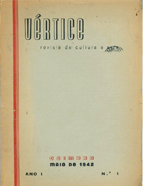

................................
Published uninterruptedly between 1942 and 1986 (the new series only resumed two years later, continuing to the present day), Vértice occupied a prominent place in 20 th -century Portuguese culture. In addition to its remarkable longevity for a journal of its kind, perhaps only comparable in this respect to Seara Nova, its relevance is also justified by the fact that it established itself as one of the main spaces of cultural resistance to the Estado Novo, where sometimes diverse and conflicting paths developed, expressing above all Marxist-inspired worldviews and a general impetus for renewal in the cultural field. Its importance also lies in the different fields of knowledge covered in its pages: literature, film and theatre criticism, visual arts, music, economics and history, among other subjects discussed by some of the most prominent intellectuals of the time.
The early years of the Coimbra journal did not foreshadow the longevity and importance it would come to have. Between 1942 and 1944, only three issues were published in a context of extreme financial difficulties and uncertainty about the immediate future of the publication. And while it is true that these difficulties persisted throughout its existence, from 1945 onwards, Vértice took a new direction. It had been acquired by a group of young intellectuals linked to neo-realism (Arquimedes Silva Santos, Carlos de Oliveira, João José Cochofel, Rui Feijó and Joaquim Namorado), who injected it with new vitality, immediately evident in the first editorials that defined the new guidelines. Following the suspension of several cultural journals with a significant Marxist presence in the early 1940s, this group’s initiative responded to the concerns of the intellectual sector of the Portuguese Communist Party in Coimbra, which noted the absence of a platform where they could convey their ideas (Luís Andrade, Intelectuais, Utopia e Comunismo , 2010, pp. 160-1).
This work is financed by national funds through FCT - Foundation for Science and Technology, I.P, in the scope of the projects UIDB/04311/2020 and UIDP/04311/2020.
